But Republicans and Democrats are sharply divided when it comes to immigration levels.
Immigration to the United States has long been a contentious and divisive issue at the forefront of American political debates, including the recent congressional negotiations over continued US aid to Ukraine. Today, more than 46 million immigrants, or 14 percent of the American population, reside in the United States and their total share is projected to grow by three percentage points within the next several decades.
The 2023 Chicago Council Survey, conducted September 7–18, 2023, finds stark partisan divisions in American attitudes toward immigration. Whereas Democrats strongly believe immigration makes the country a better place to live in, Republicans largely think immigration poses a critical threat to vital US interests. Despite these partisan differences, most Americans favor a path to citizenship for undocumented or illegal immigrants.
Key Findings
- Five in 10 Americans (51%) say the increasing number of people from many different races, nationalities, and ethnic groups in the United States makes the country a better place to live.
- Four in 10 Americans (42%) say the prospect of large numbers of immigrants and refugees coming into the United States represents a critical threat to the vital interests of the country in the next 10 years.
- A plurality of Americans (42%) say legal immigration to the United States should be kept at its present level (31 percent favor decreasing and 25 percent favor increasing it).
- Majorities of Americans support the United States accepting immigrants from countries like Ukraine (69%), Taiwan (66%), Japan (66%), South Korea (66%), India (62%), and Haiti (59%). But they are split on accepting immigrants from countries like Sudan (51% support vs. 46% oppose), China (48% support vs 49% oppose), and Russia (46% support vs. 50% oppose).
- The majority of Americans (64%) favor a path to citizenship for unauthorized immigrants1 working in the United States, either with (24%) or without (40%) a fine or waiting period.
Continued Partisan Division over Perceived Threat of Migration
Four in 10 Americans overall (42%) say that the prospect of large numbers of immigrants and refugees coming into the United States represents a critical threat to the country, broadly consistent with readings over the past decade. But over that period, divisions between Republicans and Democrats have continued to grow. Today, seven in 10 Republicans (72%), four in 10 Independents (39%), and two in 10 Democrats (18%) view the issue as a critical threat. For Republicans, immigration is one of their top threats; for Democrats, it is the least concerning item out of all potential threats presented in the 2023 Chicago Council Survey.
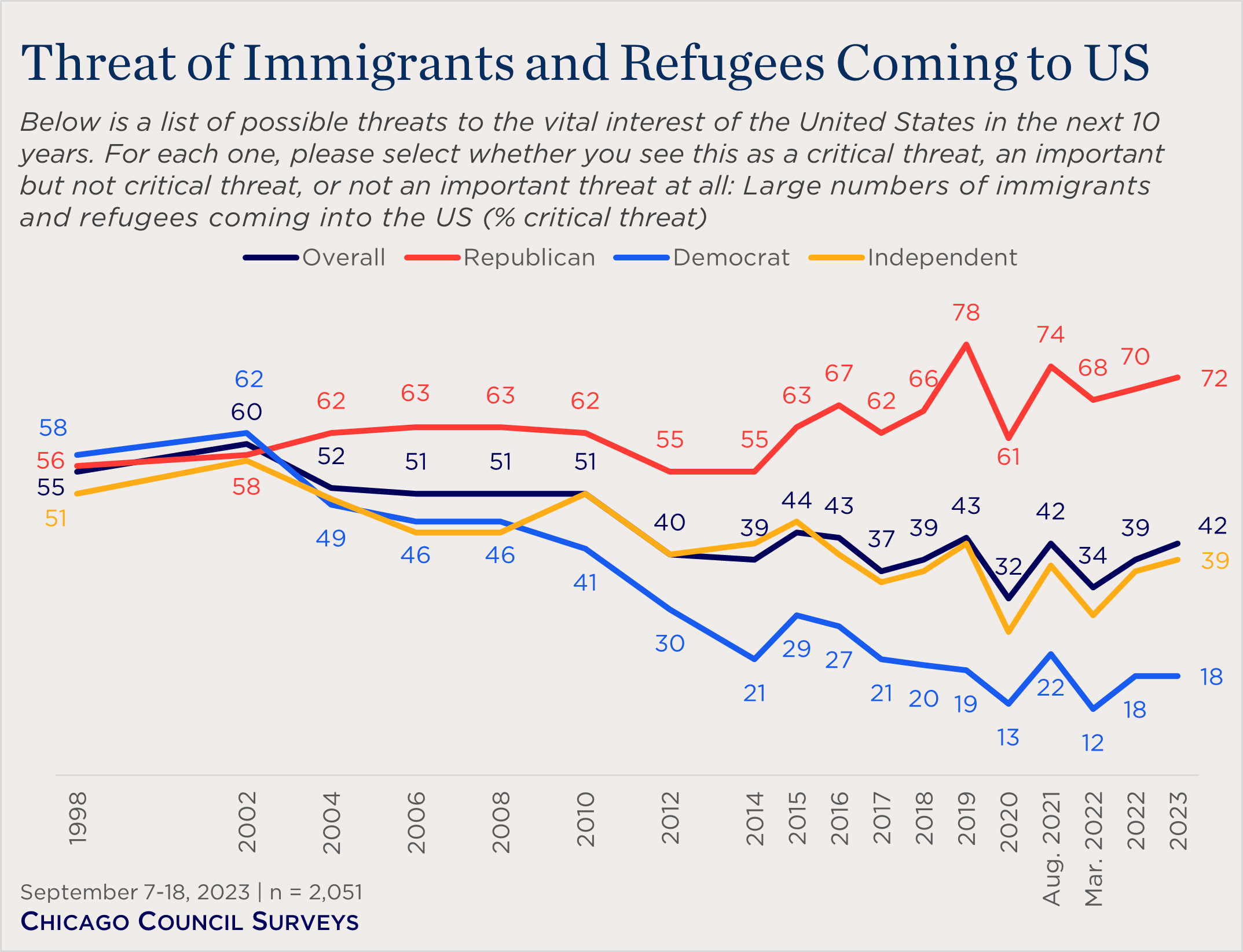
Americans Divided over Legal Immigration Levels
Today a plurality of Americans (42%) says that legal immigration to the United States should be kept at its present level. Three in 10 (31%) favor decreasing and one in four (25%) favor increasing legal immigration levels. In general, over the past two decades Americans have become less likely to support cuts to legal immigration and more likely to favor maintaining or increasing legal immigration levels. However, that shift in opinion has played out very differently among Republicans and Democrats.
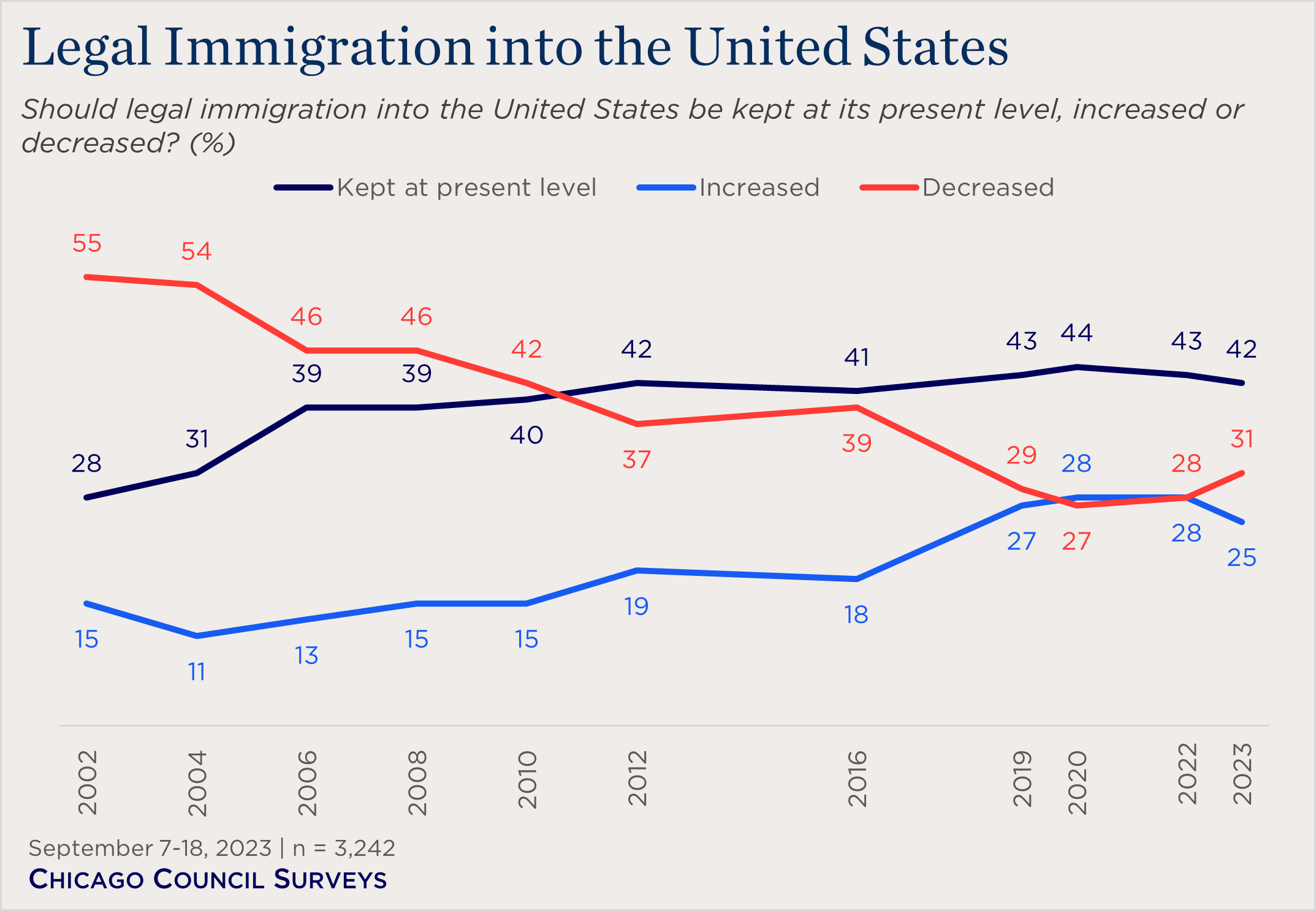
As is the case for many immigration-related issues, Republicans and Democrats hold notably different views on the appropriate level of legal immigration into the United States. A majority of Republicans (51%) favor decreasing legal immigration, a position shared by just 16 percent of Democrats and three in 10 Independents. Conversely, a plurality of Democrats would prefer to keep legal immigration at present levels (48%), as would a plurality of Independents (43%); a third of Republicans (34%) agree. Finally, a further third of Democrats (35%) would prefer to see legal immigration to the United States increase, as would 25 percent of Independents—but only 15 percent of Republicans.
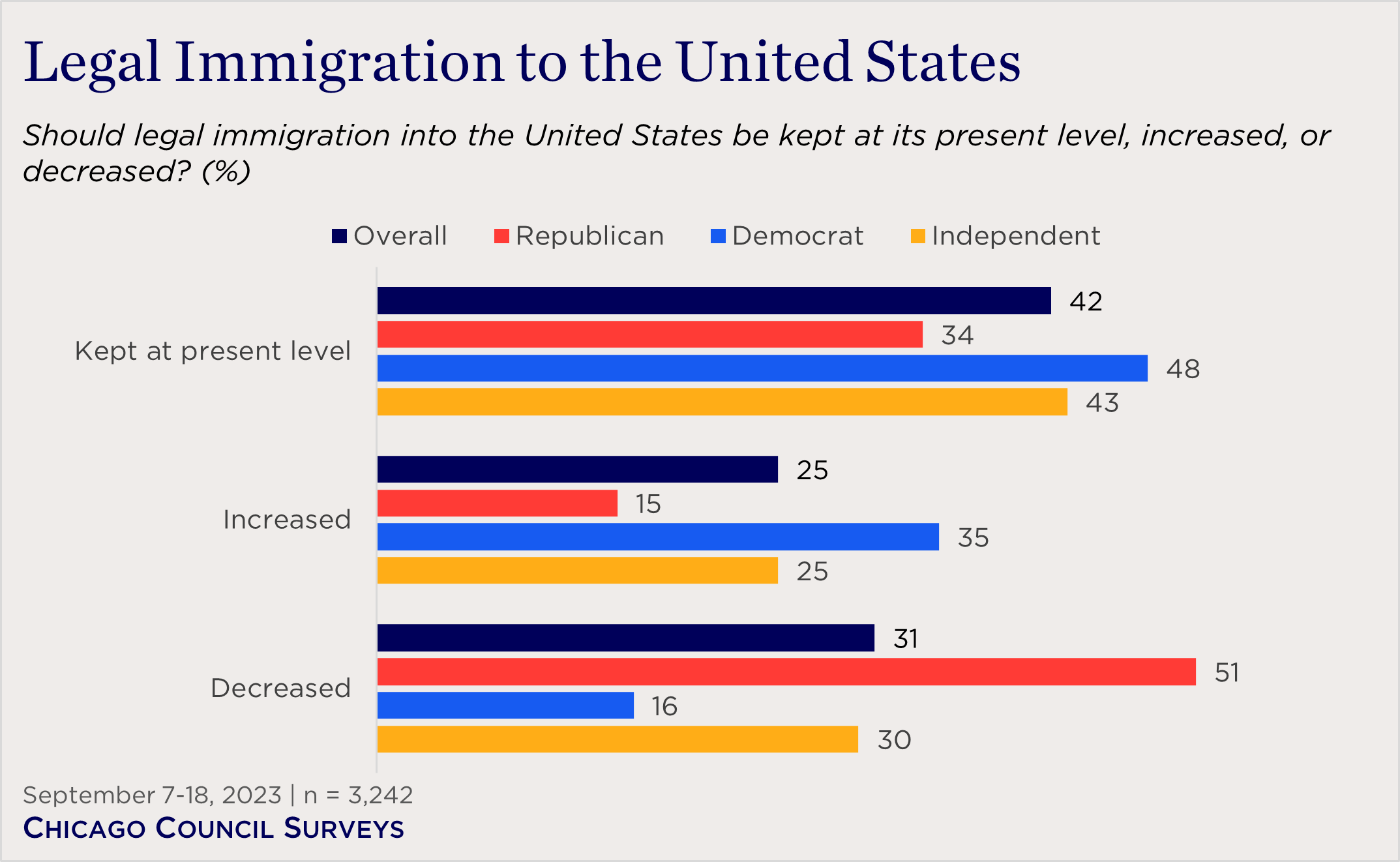
Growing Partisan Divisions on Legal Immigration
Though partisan divisions on immigration are now common across specific issue areas, this was not always the case. From 2002 through 2012, the Chicago Council Survey generally found that Republicans and Democrats held similar views on the appropriate level of legal immigration. After 2012, however, the party supporters diverged significantly. Democratic support for decreasing legal immigration continued to fall, while Republican support for legal immigration cuts more or less leveled off. As a result, the partisan gap on whether or not to decrease legal immigration levels is at an all-time high in Chicago Council Survey history.
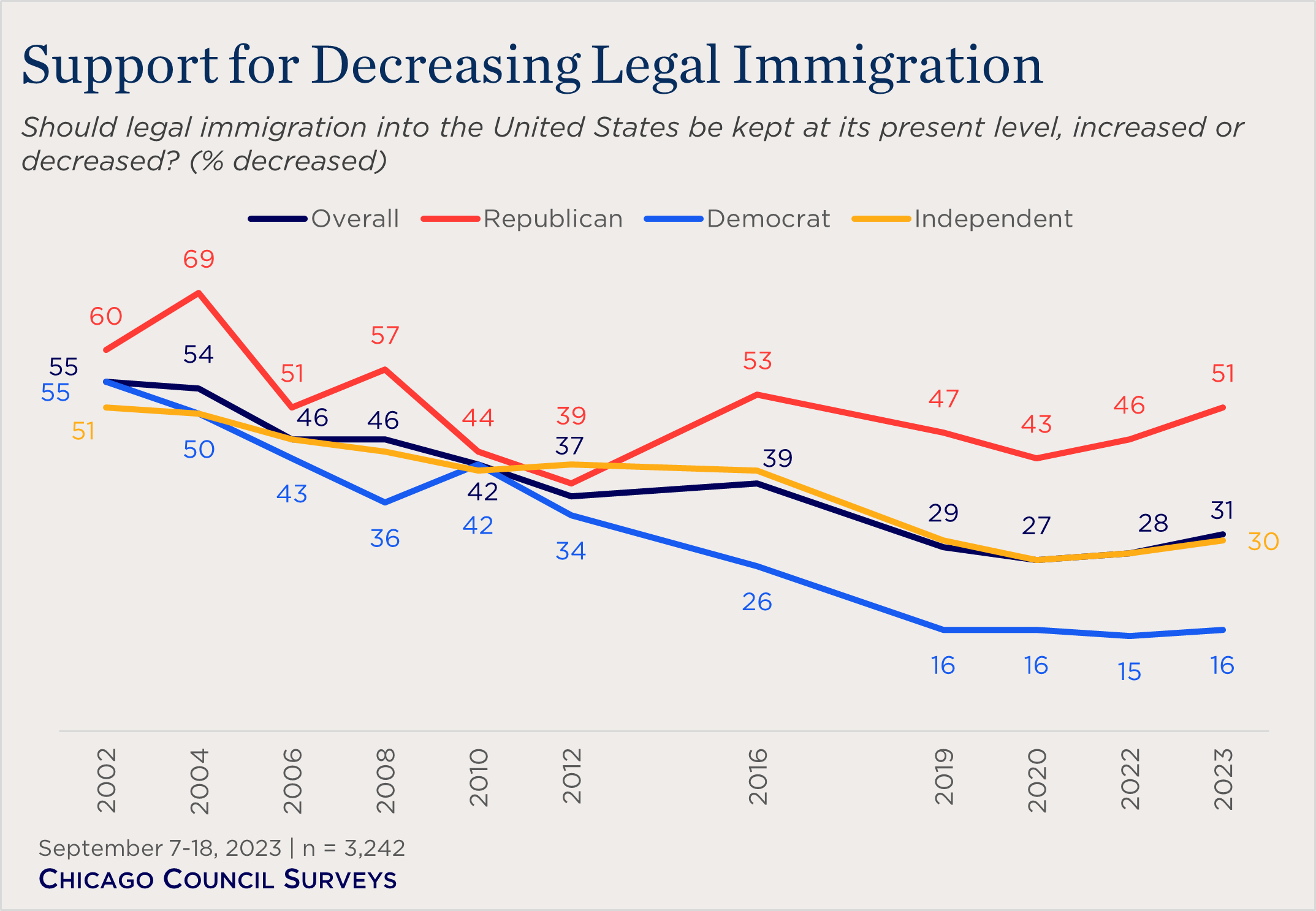
With Democratic support for immigration cuts in decline, Democratic support for increased levels of legal immigration increased in tandem. In 2020, Democratic support for increased legal immigration spiked at 43%, an all-time high steadily rising support for more legal immigration that dated back to 2004. Since 2020, support among Democrats for more legal immigration has fallen eight percentage points and returned to 2019 levels, and more Democrats have preferred instead to maintain present levels of legal immigration.
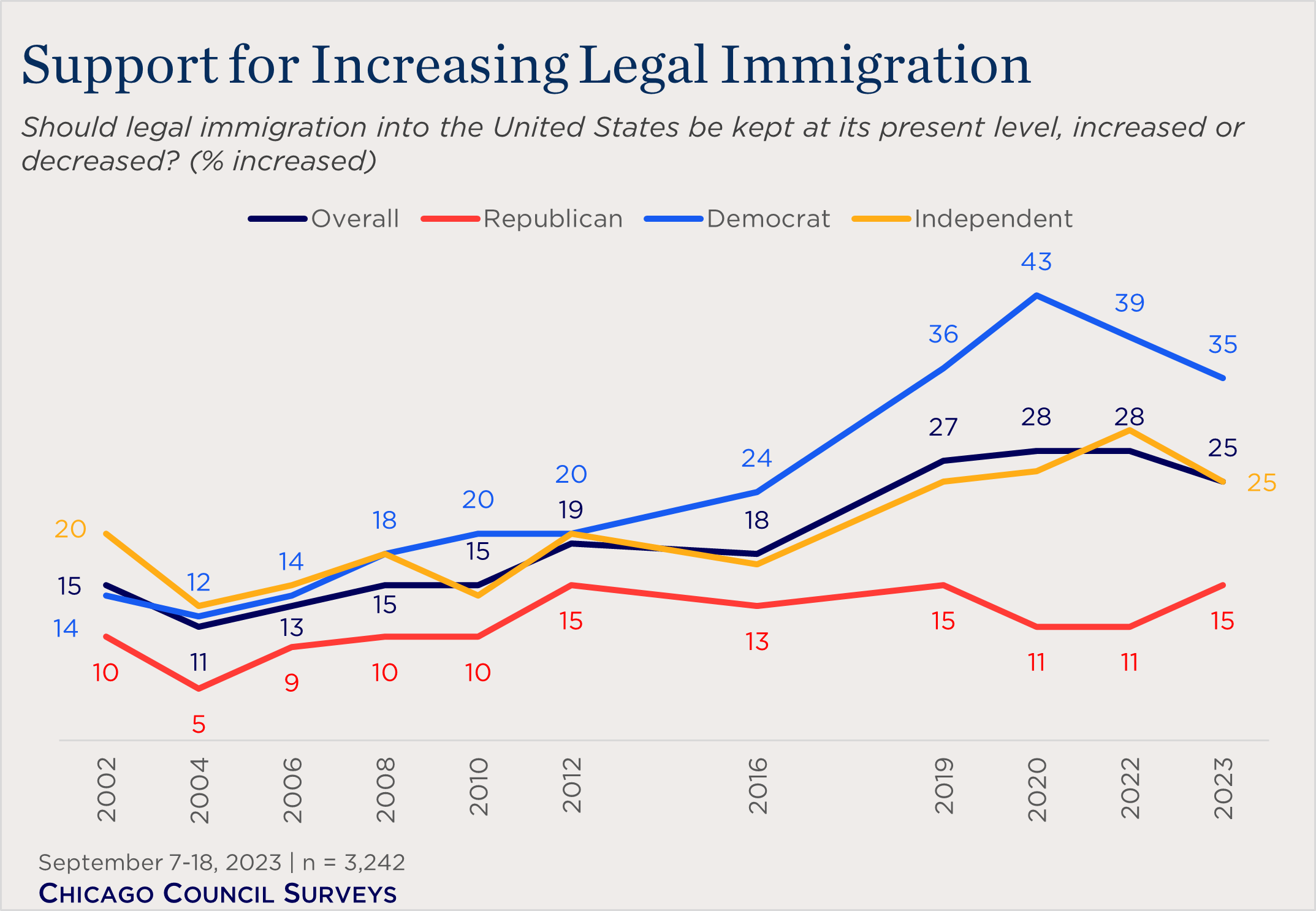
Americans Accept Immigrants from Most Nations—but not Rival Powers
To some extent, support for legal immigration also depends on the immigrants’ country of origin. Majorities of Americans say they support the United States accepting immigrants from places as diverse as Ukraine (69%), India (62%), Central America (60%), Haiti (59%), Afghanistan (52%), and Sudan (51%). Two-thirds also favor accepting immigrants from key US allies and partners such as Taiwan, Japan, and South Korea (66% each). When it comes to America’s geopolitical rivals, however, the public is split. Half of Americans (50%) oppose accepting immigrants from Russia, while 46 percent support accepting them. And Americans are evenly divided over accepting immigrants from China (48% support, 49% oppose).
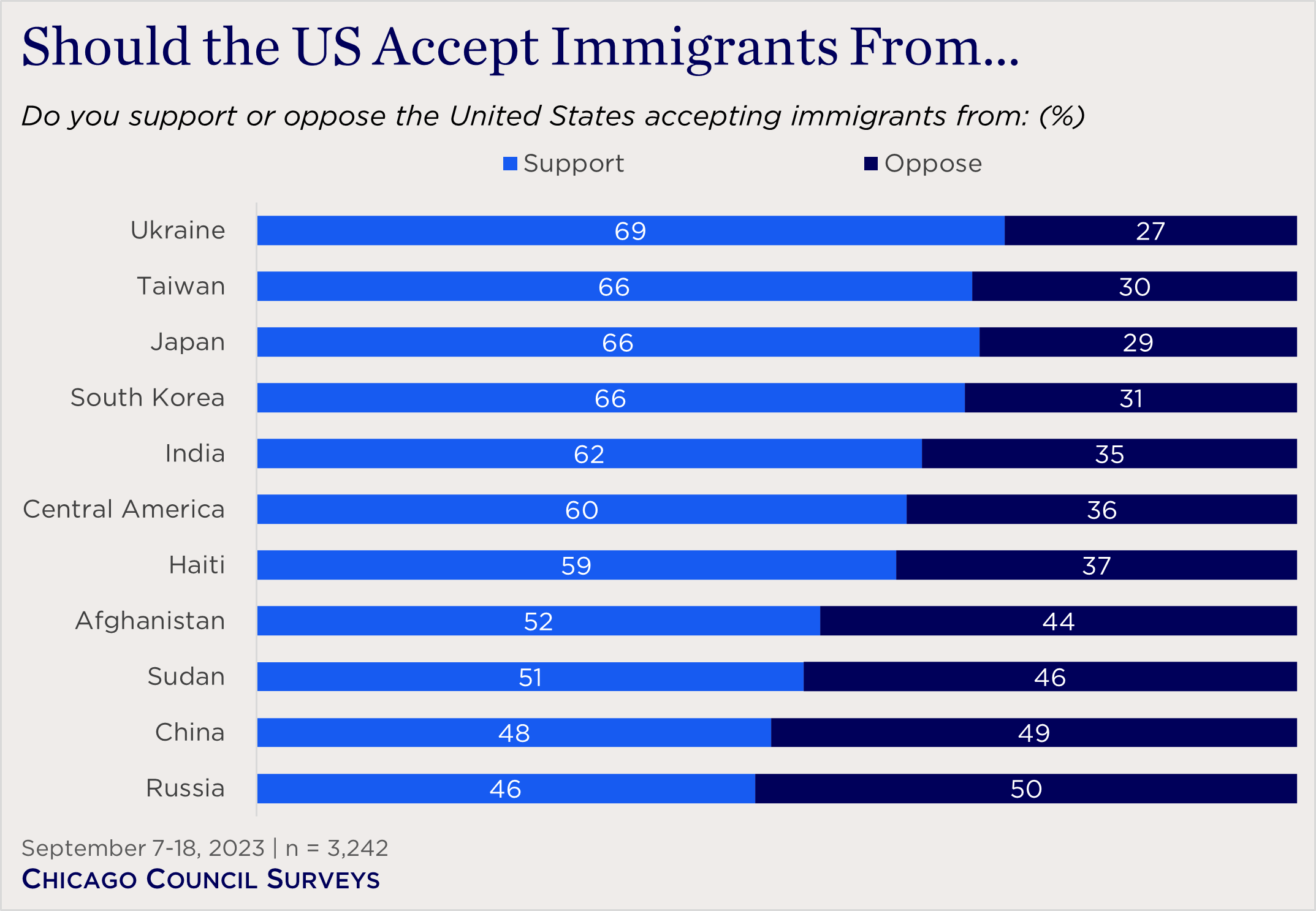
In line with their general attitudes on immigration, there are partisan divisions. A majority of Democrats favor accepting immigrants from all of the countries listed, ranging from a high of 80 percent for Ukrainians down to a narrow majority of 54 percent for Russians. Meanwhile, Republicans are only supportive of immigrants from four of the nations presented: South Korea (56%), Ukraine (55%), Taiwan (53%), and Japan (51%). A majority of Republicans oppose accepting immigrants from every other country asked about. (See Appendix for details).
Continued Support for Path to Citizenship for Undocumented Immigrants
One of the longstanding issues in American immigration policy is how to handle the large number of undocumented immigrants currently living and working in the United States. As has been the case for the last several years, two-thirds of Americans favor allowing “illegal immigrants currently working in the United States” to stay and apply for US citizenship, either immediately (40%) or following a waiting period and paying a penalty (24%). Another 13 percent of Americans favor allowing these immigrants to continue working in the United States but not to allow them to apply for US citizenship. Finally, two in 10 (21%) say that these immigrants should be required to leave their jobs and the United States.
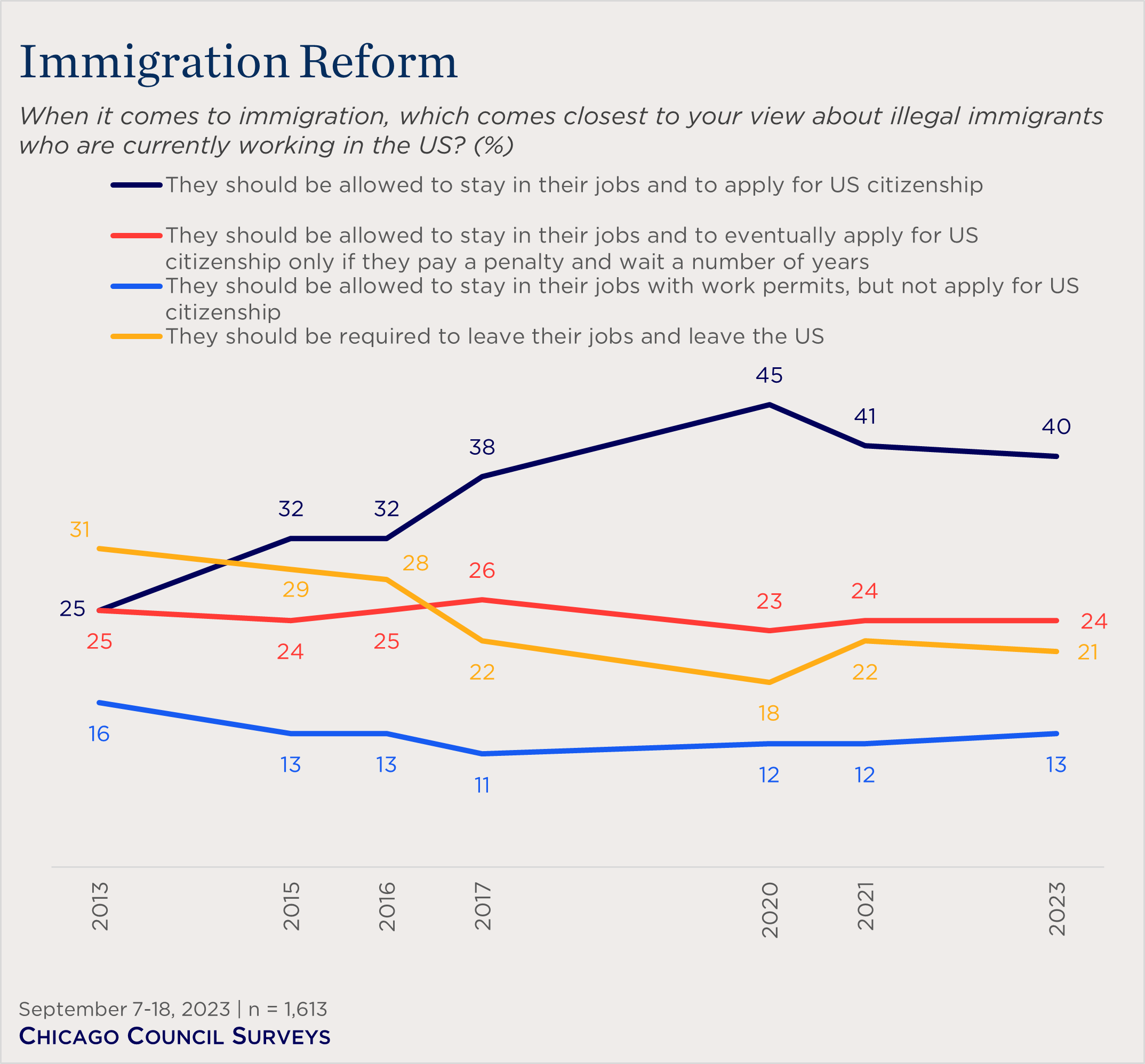
Democrats overwhelmingly favor a path to citizenship for illegal immigrants working in the United States. An outright majority (59%) favor such a path without preconditions, and another quarter (24%) support a path to citizenship with a waiting period and financial penalty. Few Democrats favor an approach based on work permits (10%) or expelling them from the United States (6%).
Republicans are more divided. Roughly four in 10 say illegal immigrants working in the US should be allowed to stay and become citizens, either now (22%) or after a penalty period (20%). A similar proportion (41%) say they should be required to leave their jobs and the country. And 17 percent favor allowing them to stay, but only on a work permit and without a pathway to US citizenship.
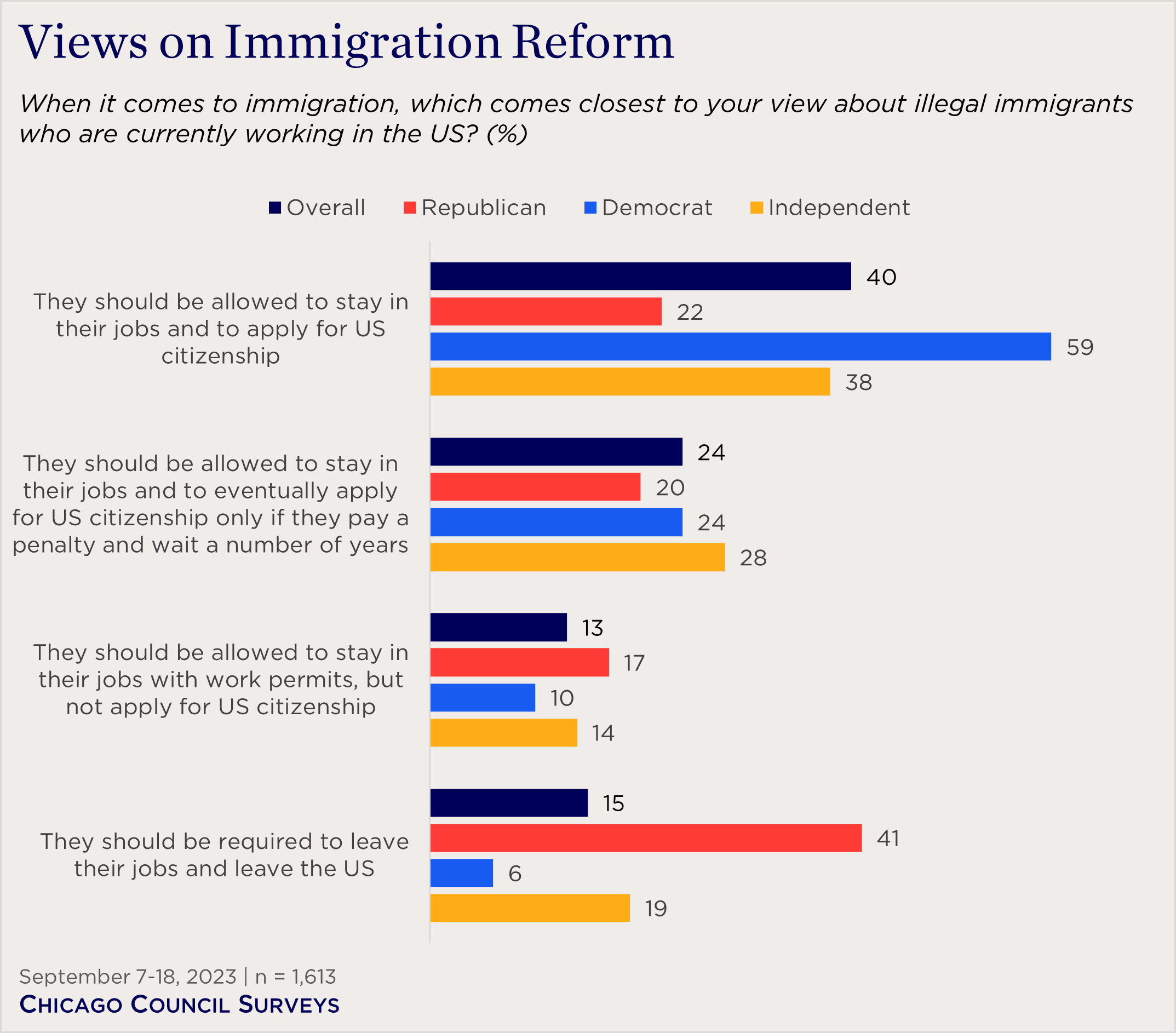
The previous question specified that the undocumented immigrants in question were those who are currently working. Some of the public support for this approach to immigration reform falls off if the question wording does not specify that the immigrants are currently holding jobs in the United States. In a separate question (asked of half the sample) that does not specify if the immigrants in question hold jobs, there is less support for extending a path to citizenship and greater support for requiring them to leave the country.
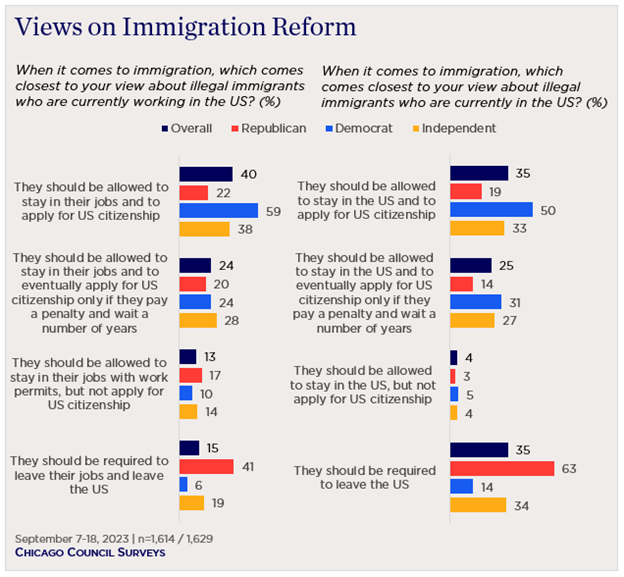
Republicans Support—and Democrats Oppose—use of US Military to Stop Migration
In addition to being more likely to support deporting illegal immigrants from the United States, Republicans are far more likely to support using the military to prevent additional migration: three-quarters of Republicans (77%) favor using US troops to stop immigrants from coming into the United States from Mexico. By contrast, only a quarter of Democrats (24%) and four in 10 Independents (42%) support such a policy, with majorities in opposition (75% and 56%, respectively).
Half of Americans Say Greater Diversity Makes Nation a Better Place to Live
One of the reasons migration has been such a major topic in American politics is the extent to which it feeds into the growing diversification of the United States. Overall, half of Americans (51%) believe that the increasing diversity of the United States makes it a better place to live in, including three-quarters of Democrats (73%), half of Independents (48%), and three in 10 Republicans (30%). However, roughly a third (30%) say it makes no difference, including a third of Republicans and Independents (35% each) and two in 10 Democrats (21%). Finally, 18 percent of Americans say that the increasing diversity of the country makes it a worse place to live. While a third of Republicans (33%) agree with this statement, only 17 percent of Independents and six percent of Democrats say the same.
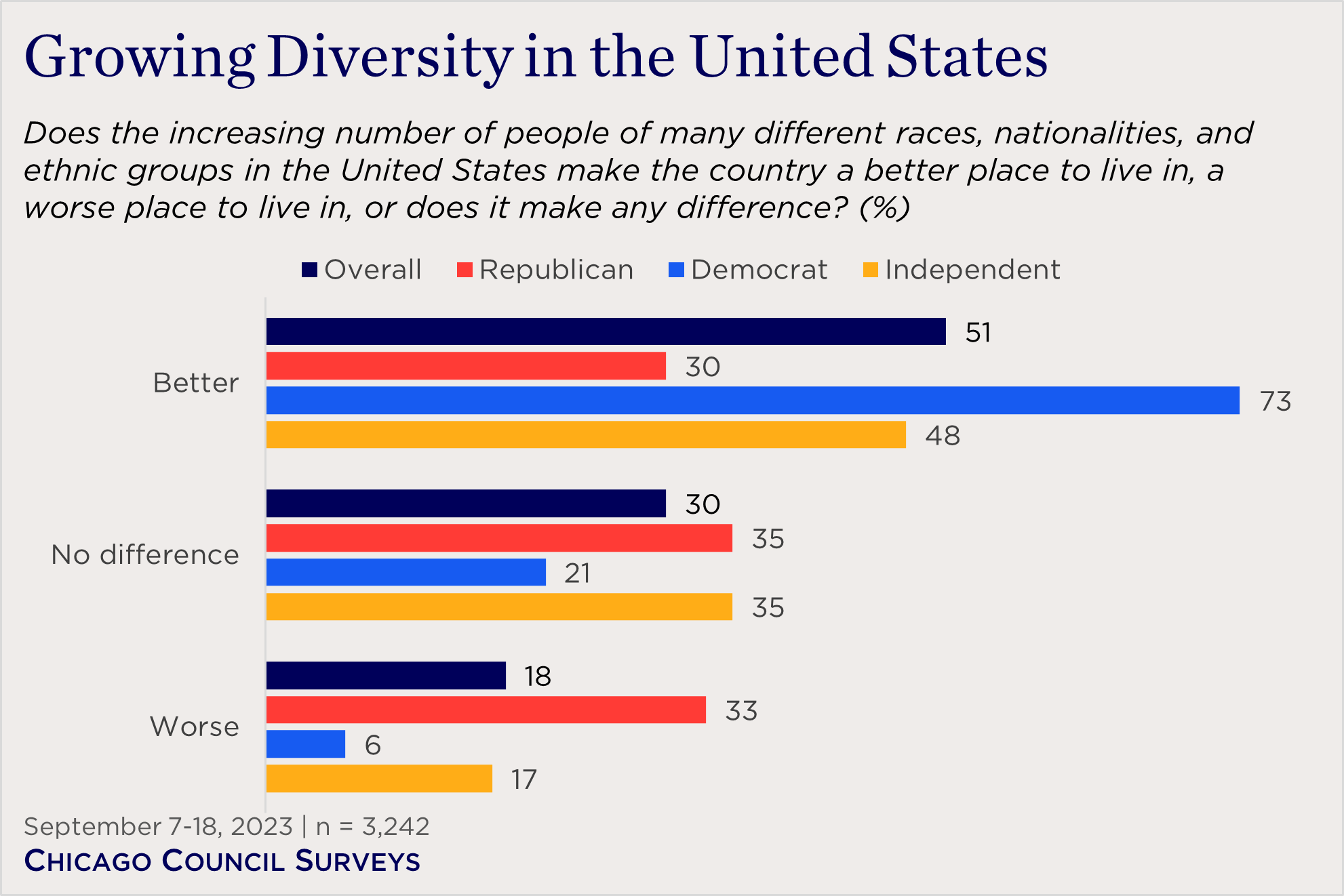
As was the case in 2022, this underlying view on the effects of diversity in the United States is strongly related to attitudes on other immigration issues. Americans who believe that diversity makes the nation better are far more likely to support accepting immigrants from every nation mentioned, are more likely to support a direct path to citizenship for illegal immigrations living or working in the United States, and are far less likely to say that large-scale migration into the country represents a critical threat.
By contrast, those who believe greater diversity makes the nation a worse place to live oppose accepting immigrants from every country asked about. They are also far more threatened by the prospect of large numbers of immigrants and refugees entering the country, are more likely to say legal immigration should be decreased, and want illegal immigrants working or living in the United States to be forced to leave the country.
- 1For reasons of trend continuity, the survey uses the language “illegal immigrants” in several questions. In past work, we also have found that describing unauthorized immigrants as “illegal” or “undocumented” affects respondents’ attitudes on immigration policy, though different groups respond in different ways. We will continue to examine how descriptions of these groups affects respondents’ views on policy matters in future surveys
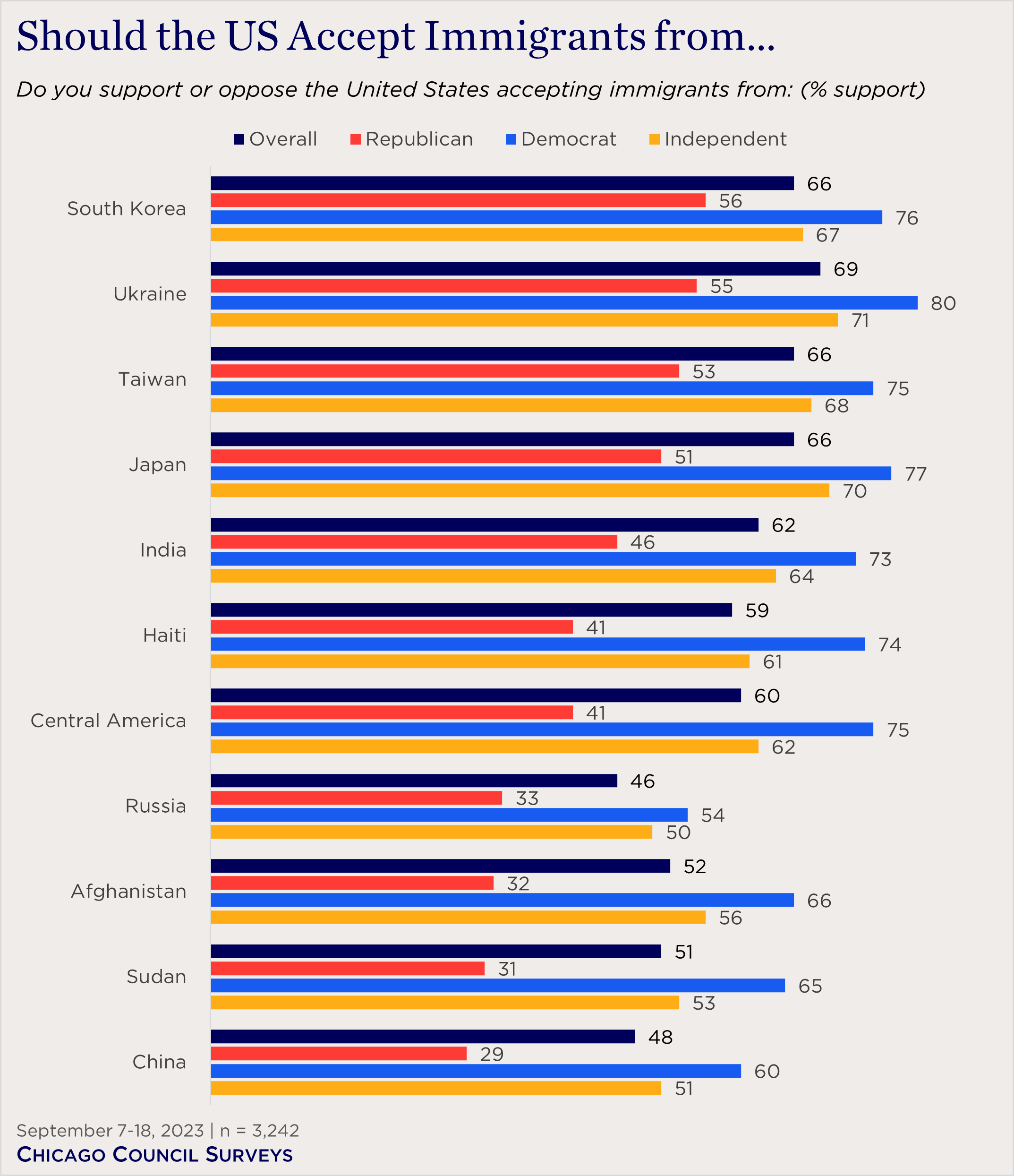
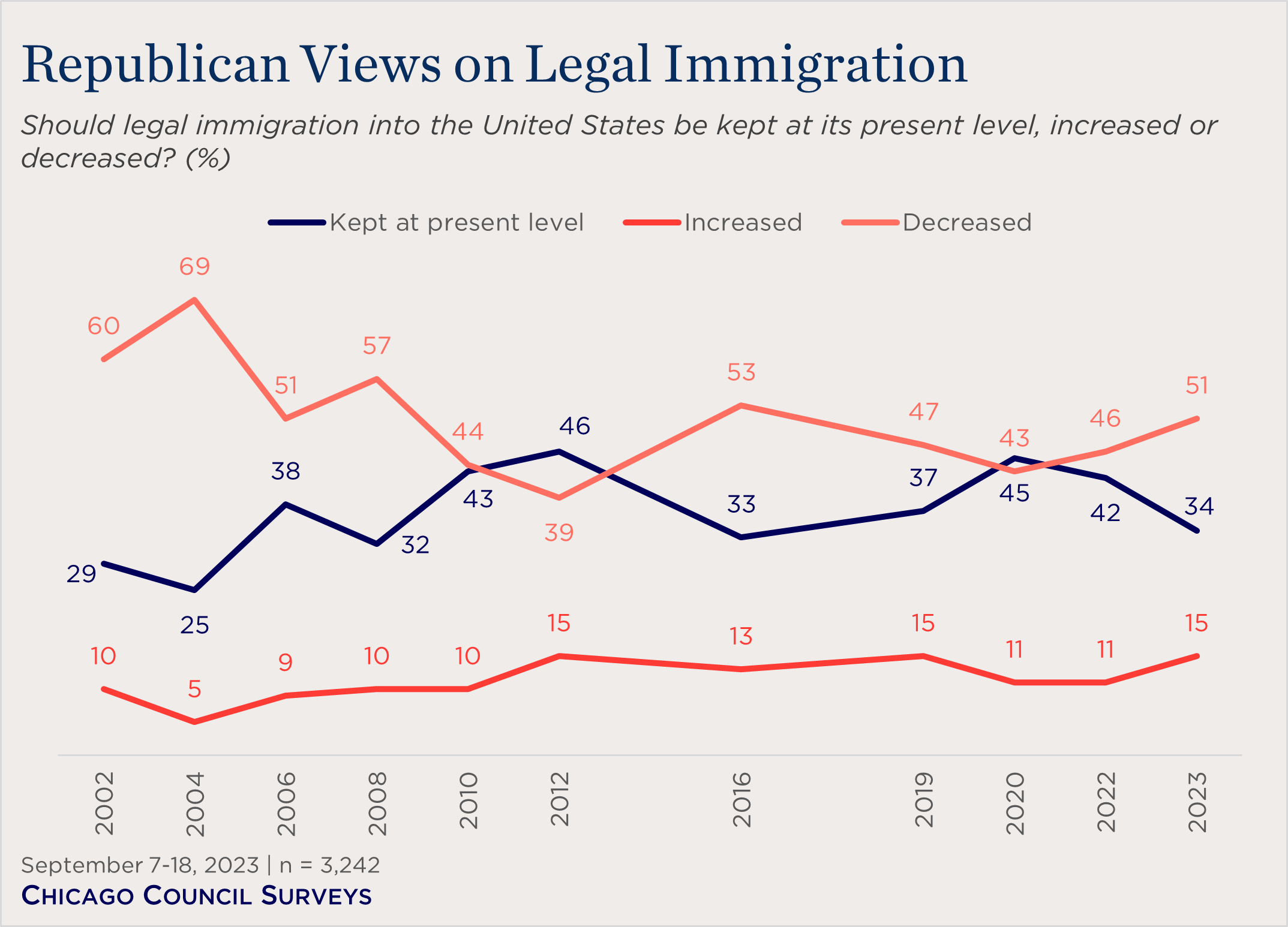
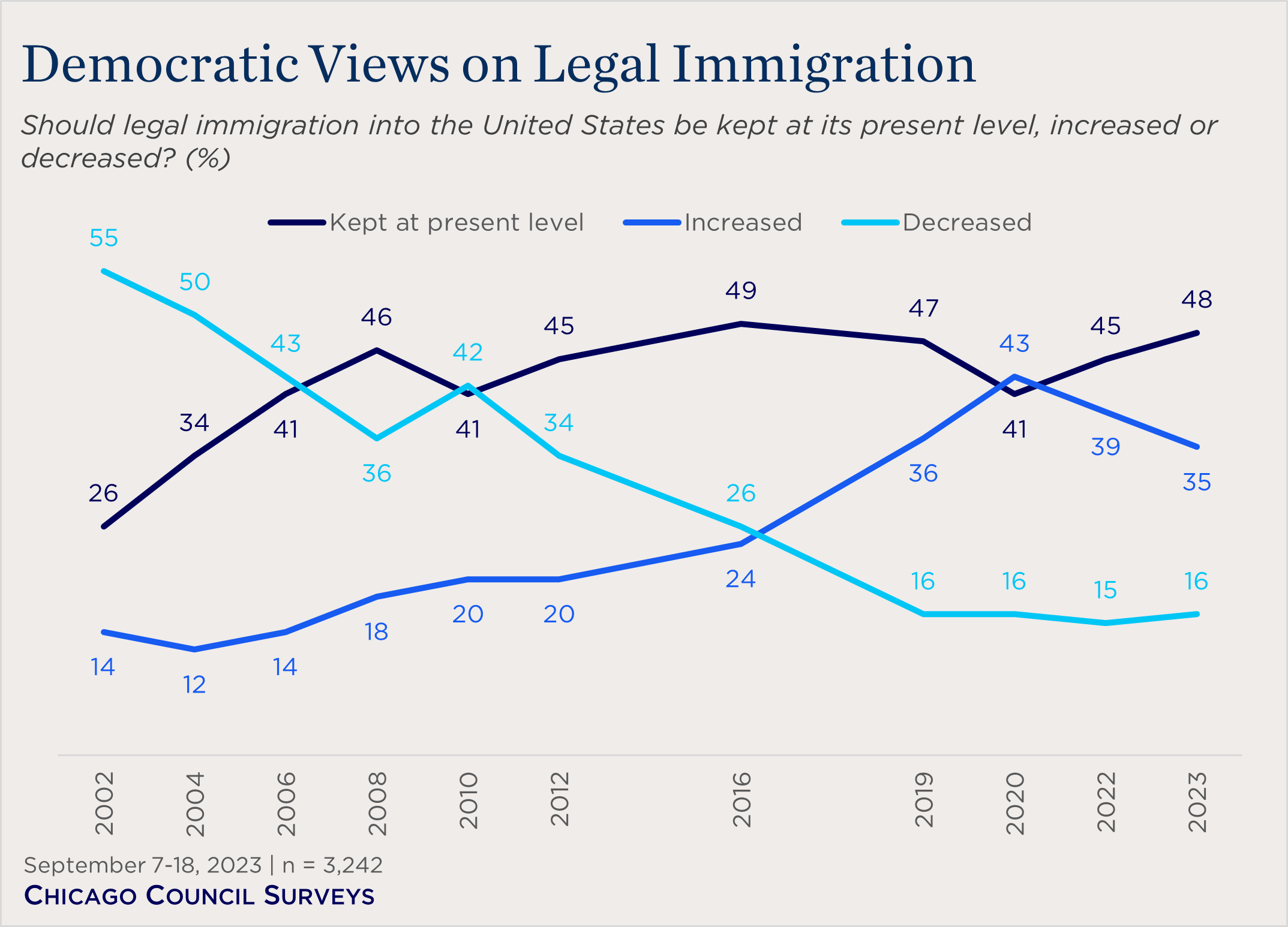
This analysis is based on data from the 2023 Chicago Council Survey of the American public on foreign policy, a project of the Lester Crown Center on US Foreign Policy. The 2023 Chicago Council Survey was conducted September 7-18, 2023 by Ipsos using its large-scale nationwide online research panel, KnowledgePanel, in both English and Spanish among a weighted national sample of 3,242 adults aged 18 or older living in all 50 US states and the District of Columbia. The margin of sampling error for the full sample is ±2.0 percentage points including a design effect of 1.2908. The margin of error is higher for partisan subgroups or for partial-sample items.
Partisan identification is based on how respondents answered a standard partisan self-identification question: “Generally speaking, do you think of yourself as a Republican, a Democrat, an Independent, or what?”
The 2023 Chicago Council Survey is made possible by the generous support of the Crown family, the Korea Foundation, and the United States-Japan Foundation.




Related Content
 Migration
Migration
While half of Americans and a majority of Democrats say diversity makes the United States a better place to live, Republicans aren’t so sure.
 Migration
Migration
But American concern about large numbers of immigrants and refugees coming into the country has steadily decreased over the past decades.
 Migration
Migration
Even if Trump isn't the Republican presidential nominee in 2024, anti-immigration policy is likely to remain a pillar of the party’s platform, Paul Poast writes.



